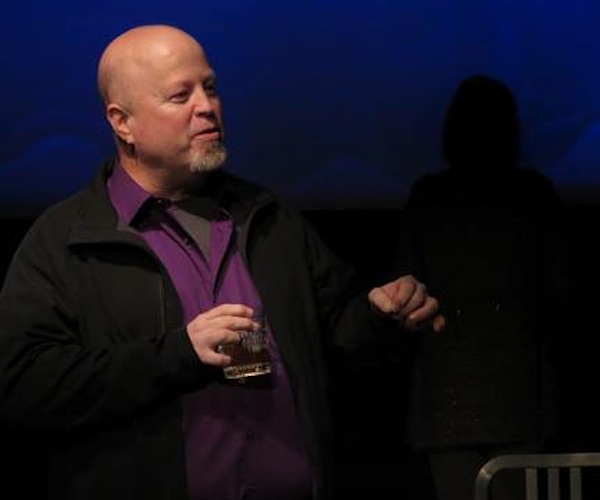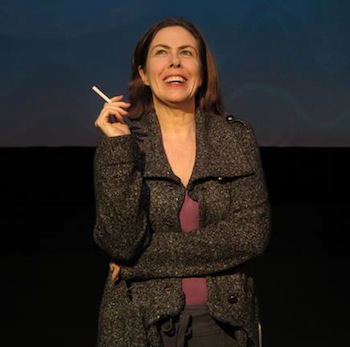Theater Review: Apollinaire Theatre Company Stages a Lyrical Trip To “Greenland”
In dramatist Nicolas Billon’s enigmatic but involving Greenland, the audience is called on to actively reconstruct what occurred in the characters’ lives.
Greenland by Nicolas Billon. Directed by Meg Taintor. Presented by Apollinaire Theatre Company at Chelsea Theatre Works, Chelsea, MA, through March 15.

Dale J. Young as Jonathan in the Apollinaire Theatre Company production of “Greenland.”
By Ian Thal
Last year, Whistler In The Dark, one of the Boston area’s most acclaimed fringe companies, disbanded, so it is a coup for Apollinaire Theatre Company to have the troupe’s former artistic director Meg Taintor staging Canadian playwright Nicolas Billon’s 2009 hour-long play Greenland. (The script is the first part of a tryptic that includes the Iceland and Faroe Islands). Even with a new set of collaborators, Taintor demonstrates that her taste for heightened language, stylized design, and plays that demand active engagement from the audience remains robustly intact.
Tanya Morrissey (Charlotte Kinder) is an enthusiastically bright fourteen-year-old girl discussing her class project: a report on Greenland. She stands on a stage floor on which a large irregularly angular white form resembling an ice floe is painted over a black background. Teenagers tend to wildly free-associate, so we also learn that she lives with her Aunt Judy (whom she seeks to annoy) and Uncle Jonathan (whom she adores) and that her fraternal twin brother, Thomas recently died. Tanya is out-going, intelligent, and and resilient: ironically, her recent tragedy has helped her advance up the adolescent pecking order. She knows the right girls to ostracize and verbally abuse – especially about their weight. She has not been ostracized as a nerd because she is sufficiently charming about her oddness — at least as long as she remembers to balance empathy with meanness. Kinder does a fine job conveying Tanya’s efforts to project a ‘likeable’ self-image, undercut by brief pangs of shame she has when she realizes that she enjoys being the bully.
Greenland fascinates Tanya because of her affection for her uncle, Doctor Jonathan Fahey (Dale J. Young), a famed glaciologist who recently discovered a new island off the coast of Greenland. It is “new” because the island had remained buried under glacial ice — now melted because of global warming.
Up until he begins his monologue, Jonathan has been standing on the upstage left coast of the ice floe, contemplating a rye whisky on the rocks. Young’s quiet stance sums up his portrait of Jonathan, a man with dry humor who can glimpse wonder in a molecule. He describes himself as “born with a silver question mark in my mouth,” whose first word was “why?” An atheist, his “three-letter word of consolation” isn’t “God” but “ice.” For many years he had been happy to talk about the ice in the esoteric language of the sciences, but the discovery of the island had brought him into the public spotlight., Now he must struggle to translate science into mythology, to become “the ice whisperer” for his new-found audience.
Because the island’s discovery occurred so close to a death in the family, Jonathan attempts to name the territory in his nephew’s honor. Greenland’s government refuses the request, insisting that the island be named in Greenlandic, the indigenous Eskimo-Aleut language known by its speakers as Kalaallisut. Tanya, nonetheless, crafts a creation myth for what is eventually named Uunartoq Qeqertaq or “The Warming Island.”
(Uunartoq Qeqertaq is a real place, and its geographic features match the description Tanya gives in her school project – including the three peninsulas that give the island the appearance of either a claw or a stylized “W” – its 2005 discovery is credited to the explorer Dennis Schmitt.)
Aunt Judy, or Judith Fahey (Christine Power) isn’t coping well with the family’s recent tragedies or with Tanya’s or Jonathan’s coping strategies. She has become a resentful woman after multiple tragedies — the death of her sister and brother-in-law two years earlier (one remarkably similar to the fatal 2006 Big Dig ceiling collapse) that led to the adoption of the twins, Thomas’s recent death, and the melting of Arctic ice cap — have all conspired to defer her desire to have children of her own. She is jealous that she has been been left outside of the bonds of affection shared by Jonathan, Tanya, and Thomas. She is also an actress frustrated with her career: she’s always been good enough to make a living on stage (remember that this is Canada where the arts receive government subsidies), but she was never deemed ‘sexy’ enough land a starring role. Resigning herself to a second-class career, she pinned her hopes on the middle-class respectability conferred by marriage to a noted academic. Now she resents that the crisis of global warming means that her husband’s work is never going to fit into a neat, 9-to-5 grid.
Judith’s brand of mourning is distinctly unpleasant, but Power generates ribald comedy by drawing on the character’s anger and resentment. The figure’s aggression comes in various forms: the first words of her litany, “Fuck the polar bears,” moves onto her using her cigarette smoking to attack the hypocrisies and destructive habits of the audience, which leads to her possibly rash decision, once she concludes that bourgeois normality is no longer in the cards, to introduce some chaos into her life. (Note: Gillian Mackay-Smith is scheduled to take over the role in the closing weekend.)

Christine Power as Judith the Apollinaire Theatre Company production of “Greenland.”
Even though it has become common for dramatists to thumb their nose at Aristotelian unities of time, place, and action, most plays still adhere to telling their narrative in chronological order. Occasionally, a playwright tinkers with chronology, mindful that he or she is in competition with the how often (and well) jumping about in time and space is accomplished in film and television programs. In Iceland, Billon dispenses with the unities, though the four monologues (Tanya bookends the play with a second monologue) contain a storyline. But the audience is called on to actively reconstruct what occurred in the characters’ lives. This is, of course, what we do in our own lives as we make sense of different iterations of our family stories or the interpersonal histories of our friends and acquaintances. It shouldn’t be surprising that Taintor chose to stage this play: she has long favored scripts that require her audiences to accept an interpretive role, to help ‘create’ what they see.
In the few conversations I had at the post-show reception, audience members were still processing a play that refuses to provide closure for its characters or catharsis for the audience. The only element that provides that kind of traditional dramatic satisfaction is Tanya’s composition of a creation myth for Uunartoq Qeqertaq, one that incorporates both the death of her brother and Jonathan’s loss of a toe to frostbite. Jonathan has a escapist dream during his long stink camping out on the island: he forgets about Judith back in Toronto, and falls in love with a “tall buxom, Danish woman” and shares a morbidly romantic death with her. But this doesn’t offer much illumination; it is a flight of fancy he wistfully muses upon after returning home. Never once do the characters interact on stage – and some stage critics might argue that means Greenland should not be considered a ‘proper’ drama. The survival of the Fahey-Morrissey family as an intact unit — now that its numbers have been decimated — is as much in question as the survival of the biosphere of the northern hemisphere given that the ice cap is melting. Still, the hour the audience has spent concentrating on the lives of these three characters is well spent; the effect is both lyrical and enigmatic – and on a certain level, more natural than a “naturalistic” play that ends with a climax and denouement.
Billon’s monologues are thoughtfully contrasted with Apollinaire Theatre Company’s simple design elements, ranging from the aforementioned ice floe to a long, panoramic window-like scrim that hangs on the horizon line, The latter is the production’s most striking visual element: it’s hard to tell to what extent it is the creation of scenic designer Matheus Fuiza or lighting designer Danielle Fauteux Jacques. Over the course of the show, the abstracted field of sea ice takes on different hues, evoking a subtle sense of metamorphosis — even under an endless days of an arctic summer, time still passes, the sun still moves. Change happens.
Ian Thal is a playwright, performer and theater educator specializing in mime, commedia dell’arte, and puppetry, and has been known to act on Boston area stages from time to time, sometimes with Teatro delle Maschere. Two of his short plays appeared in theater festivals this past summer. He has performed his one-man show, Arlecchino Am Ravenous, in numerous venues in Massachusetts and Rhode Island. One of his as-of-yet unproduced full-length plays was picketed by a Hamas supporter during a staged reading. He is looking for a home for his latest play, The Conversos of Venice, which is a thematic deconstruction of Shakespeare’s The Merchant of Venice. Formerly the community editor at The Jewish Advocate, he blogs irregularly at the unimaginatively entitled From The Journals of Ian Thal, and writes the “Nothing But Trouble” column for The Clyde Fitch Report.
Tagged: Apollinaire Theatre Company, Chelsea Theatre Works, Danielle Fauteux Jacques, Greenland
